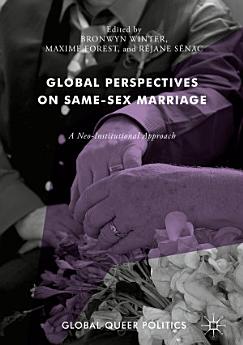Global Perspectives on Same-Sex Marriage: A Neo-Institutional Approach
About this ebook
The analytical framework used for exploring these factors in this book is neo-institutionalism. Through three neo-institutionalist lenses—historical, sociological and discursive—contributors investigate two aspects of the processes of adoption or opposition of equal recognition of same-sex partnerships. Firstly, they reveal how claims by LGBTIQ movements are being framed politically and brought to parliamentary politics. Secondly, they explore the ways in which same-sex marriage becomes institutionalized (or resisted) through legal and societal norms and practices. Although it adopts neo-institutionalism as its main theoretical framework, the book incorporates a broad range of perspectives, including scholarship on social movements, LGBTI rights, heterosexuality and social norms, and gender and politics.
About the author
Bronwyn Winter is Deputy Director of the European Studies program at the University of Sydney, Australia, where she also contributes to the International and Global Studies program.
Maxime Forest is Researcher, Senior Lecturer, and Scientific Coordinator at the EU-funded EGERA project (Effective Gender Equality in Research and the Academia, Framework Project 7) at Sciences Po Paris, France.
Réjane Sénac is a National Centre for Scientific Research (CNRS) Tenured Researcher at the Centre for Political Research (CEVIPOF) at Sciences Po Paris, France.





